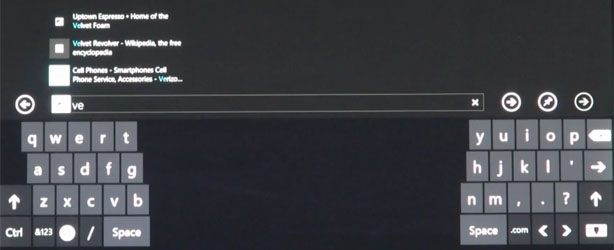
Windows 8 ARM and legacy support
Microsoft looks as though it's attempting to address the problem that the standard Windows 7 UI is clunky on a tablet, not only with the new interface, but also with new features. One of these is the touch keyboard, which splits into two parts at either side of the screen in a way that's reminiscent of the DialKeys interface that was introduced in the TouchPack for UMPCs.What's immediately apparent is that Microsoft is very seriously looking at touch-based interfaces as the future, to the point where it's prioritising this interface over the standard computer desktop interface. This point is further emphasised by the fact that Windows 8 is the first full Microsoft operating system that will be available for both x86 and ARM processor architectures.
Intel's senior vice president and general manager of its Software and Services Group, Renée James, has recently attempted to dismiss this as a threat to its business. 'On ARM, there'll be the new experience, which is very specifically around the mobile experience, specifically around tablet and some limited clamshell, with no legacy OS,' James told attendees at Intel's 2011 Investors Meeting. 'Our competitors will not be running legacy applications. Not now. Not ever.'

The new touch-based keyboard splits into two parts on either side of the screen
She also added that 'there will be four Windows 8 SoCs for ARM. Each one will run for that specific ARM environment, and they will run new applications or cloud-based applications.' According to James, the different versions of Windows 8 'are neither forward- nor backward-compatible between their own architecture – different generations of a single vendor – nor are they compatible across different vendors. Each one is a unique stack.'
However, Microsoft's president for Windows and Windows Live, Steven Sinofsky, rebutted that, saying that Intel's statement was 'factually inaccurate and unfortunately misleading.'. What exactly is right or wrong about Intel's statement remains to be seen, but Microsoft has already demonstrated a laptop based on Nvidia's ARM-based Tegra 3 platform.
'ARM isn't just for tablets,' said the company in the demonstration, caught on video by the guys at Netbook News. 'ARM enables ultra-portable computers of any form factor, so in this case I may want to have the all-day battery life and power-efficiency of ARM, but on a more productive form factor like a notebook.'
The 'Kal-El' hardware in the demo features a quad-core CPU, and the presenter proudly introduces it as 'real Word, running on ARM.' Basically, it looks as though ARM-based devices will have enough power to run traditional Windows desktop applications as well as tablet-orientated apps. The only problem, however, is backward compatibility with older x86-based Windows applications.
AMD's corporate vice president Patrick Moorhead was tweeting his thoughts at the D9 demo when Microsoft's Steven Sinofsky was discussing how the ARM version of the OS will handle older software, during which he tweeted: 'Sinofsky on Win8 for legacy apps on ARM: "we won't do virtualization". Translation- NO, it won't run.'
You won't be able to run x86 code natively on the ARM version of Windows, and with no virtualisation you won't even be able to do it non-natively. Basically, all apps for the ARM version of Windows look like they're going to have to be rewritten or ported over for the different architecture. This can be done, of course – look at how quickly Apple moved over from PowerPC to x86 – but that was an OS-wide change in processor architecture, rather than a decision to run an OS on two architectures concurrently.
That is, you had to make the move or be stuck without Mac support. With Windows 8 it looks like you'll have the choice to port or not, and that will be based on how much you have to spend on the work and how relevant your software is to a mobile device.
Whether software is rewritten or ported over or not, the fact also remains that any current Windows software is not going to run on the ARM-based version of Windows 8. Whether or not this is a major issue will depend on the importance of legacy Windows software on tablets and low-power laptops. It may not even be much of an issue with a closed app store, but it will be a barrier to ARM taking over from x86 on more powerful systems.
There's no official word on when Microsoft plans to release Windows 8, but the company's gaffe-prone equivalent of Prince Philip, Steve Ballmer, recently said it would be out in 2012. Although this was quickly retracted by Microsoft's official spokespeople, a 2012 timeframe seems about right. Microsoft is promising more blog updates about the new OS in the future, so watch this space.

MSI MPG Velox 100R Chassis Review
October 14 2021 | 15:04








Want to comment? Please log in.